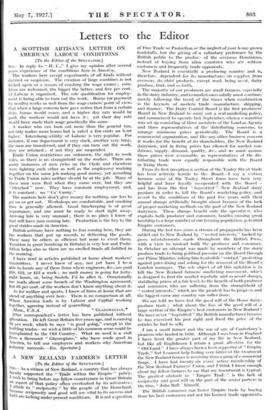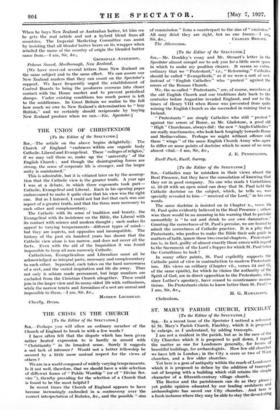A NEW ZEALAND FARMER'S LETTER
[To the Editor of the SPECTATOR.] Sia,--As a citizen of New Zealand, a country that has always loyally supported the " Tiade within the Empire " policy, I Wish to bring before my fellow-countrymen in Great Britain b aspect of that policy often overlooked by its advocates ; allude to tk reciprocity " by the people of the Homeland, Because reciprocity and good will are vital to its success and lath are lacking under present conditions. It is not a question of Free Trade or Protection or the neglect of your home-grown foodstuffs, but the giving of a voluntary preference by the British public to the produe: of the overseas Dominions, instead of buying from alien countries who arc seldom customers and frequently trade opponents.
New Zealand is essentially a producing country and is, therefore, dependent for its manufactures on supplies from overseas, its chief products, except wool, being meat, dairy produce, fruit, and so forth,
The majority of our producers arc small farmers, especially in the dairy industry, and to market successfully must combine, merely following the trend of the times when combination is the keynote of modern trade—manufacture, shipping, and finance. The Dairy Control Board is the first producers' Board in New Zealand to carry out a real marketing policy, and commenced to operate last September, when a committee was set up consisting of three members of the London Agency and three representatives of the distributing concerns, to arrange minimum prices periodically. The Board is a commercial organization, and like any other business concern it works for the benefit of its shareholders, the New Zealand dairymen, and in fixing prices has allowed for market con- ditions, supply, demand, quality, /ie., and we must assume those prices were reasonable, as representatives of the dis- tributing trade were equally responsible with the Board in fixing them.
From its first inception a section of the Tooley Street trade has been actively hostile to the Board—I say a section because some of the Tooley Street firms have been very helpful and have loyally co-operated with the Board and has from the first " boycotted " New Zealand dairy produce in order to kill the Board's marketing policy, and revert to the conditions of the past five years with their annual slumps artificially brought about because of the lack of proper marketing methods on the part of the New Zealand dairymen. These slumps benefit only the speculator, who exploits both producer and consumer, besides causing great hardship to a large number of our farming population, potential Empire customers.
During the last two years a stream of propaganda has been cabled out to New Zealand by " vested interests," backed by gross misstatements made throughout the British Press, with a view to mislead both the producer and consumer. In October an attempt was made by members of the dairy produce trade to bring political pressure on the Board through our Prime Minister;asking him to abolish "control," protesting against price-fixing and asking for the removal of the Board's London manager. The sole object of all this agitation is to kill the New Zealand farmers' marketing movement, wider is designed to feed the market regularly and so avoid slumps, stabilizing prices at a fair level, to the benefit of both producer and consumer, who are suffering from the stranglehold of " vested interests," which are the greatest bar to progress and the biggest curse any country can suffer from.
We are told we have lost the good will of the Home dairy- produce trade ; what about the loss of the good will of a
large section of the Empire's best customers in New Zealand ? We have never " boycotted " the British manufacturer because he has exercised his just right and fixed the price of the articles he had to sell.
I am a small farmer and the son of one of C'anterbury's pioneers who landed in 1850. Although I was born in England
I have lived the greater part of my life in New Zealand,
but like all Englishmen I retain a great affection for the " Old Land." I have always been a keen supporter of " Empire Trade," but I cannot help feeling very bitter at the treatment the New Zealand farmer is receiving from a gang of commercial thugs. I have had twenty-six years' active membership of the New Zealand Farmers' Union, and I think I know enough about my fellow-farmers to say that my resentment is typical. The greatest obstacle to " Empire Trade " is the lack of reciprocity and good will on the part of the senior partrer in the firm, " John Bull " himself.
The British consumer can foster Empire trade by buying from his best customers and not his keenest trade opponents.
When he buys New Zealand or Australian butter, let him see he gets the real article and not ft hybrid blend from all countries. The Imperial Marketing Committee can .assist by insisting that all blended butter bears on its wrapper when retailed the name of the country of origin the blended butter came from.—I am, Sir, &c.,
GRIMSDALE ANDERSON.
Pelorus Sound, Marlborough, New _Zealand.
[We have received several letters. from New Zealand on the same subject and to the same effect. We can assure our New Zealand readers that they can count on the Spectator's support. We have frequently urged the establishment of Control Boards to bring the producers overseas into closer contact with the Home market and to prevent periodical slumps. Under existing conditions too much power is left to the middleman. In Great Britain we realize to the full how much we owe to New Zealand's determination to " buy British," and we certainly should reciprocate by buying New Zealand produce when we can.—En. Spectator.]















































 Previous page
Previous page